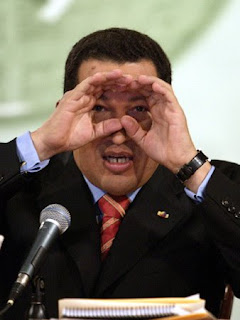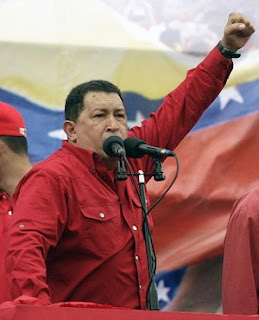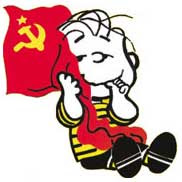 Hugo Rafael Chávez Frías (IPA: ['uɰo rafa'el 'tʃaβes 'fɾias]) (born July 28, 1954) is the current President of Venezuela. As the leader of the Bolivarian Revolution, Chávez promotes his vision of democratic socialism,[1] Latin American integration, and anti-imperialism. He is also a critic of neoliberal globalization and United States foreign policy.[2]
Hugo Rafael Chávez Frías (IPA: ['uɰo rafa'el 'tʃaβes 'fɾias]) (born July 28, 1954) is the current President of Venezuela. As the leader of the Bolivarian Revolution, Chávez promotes his vision of democratic socialism,[1] Latin American integration, and anti-imperialism. He is also a critic of neoliberal globalization and United States foreign policy.[2]A career military officer, Chávez founded the left-wing Fifth Republic Movement after orchestrating a failed 1992 coup d'état against former President Carlos Andrés Pérez. Chávez was elected President in 1998 with a campaign centering on promises of aiding Venezuela's poor majority, and was reelected in 2000 and in 2006. Domestically, Chávez has launched Bolivarian Missions, whose goals are to combat disease, illiteracy, malnutrition, poverty, and other social ills. Abroad, Chávez has acted against the Washington Consensus by supporting alternative models of economic development, and has advocated cooperation among the world's poor nations, especially those in Latin America.
Chávez's reforms have evoked controversy in Venezuela and abroad, receiving both vehement criticism and enthusiastic support. Some foreign governments, especially the government of the United States, view Chávez as a threat to global oil price stability and regional stability as a whole.[3] Others sympathize with his ideology[4] or welcome his bilateral trade and reciprocal aid agreements.[5] In 2005 and 2006 he was named one of Time magazine's 100 most influential people.[6][7]
--------------------------------------------------------------------------------
READ MORE: http://en.wikipedia.org/wiki/Hugo_chavez
VENEZUELA: http://en.wikipedia.org/wiki/Venezuela
HISTORY OF VENEZUELA: http://en.wikipedia.org/wiki/History_of_Venezuela
--------------------------------------------------------------------------------
CHAVEZ'S PHILOSOPHY:
CHAVEZ'S PARTY (MVR): http://en.wikipedia.org/wiki/Movimiento_V_República
CHAVEZ'S PARTY (PSUV): http://en.wikipedia.org/wiki/PSUV
CHAVISMO: http://en.wikipedia.org/wiki/Chavismo
BOLIVARIANISM: http://en.wikipedia.org/wiki/Bolivarianism
THE BOLIVARIAN CIRCLES: http://en.wikipedia.org/wiki/Bolivarian_Circles
--------------------------------------------------------------------------------












































